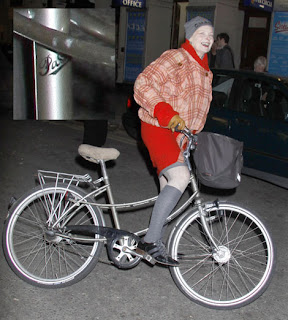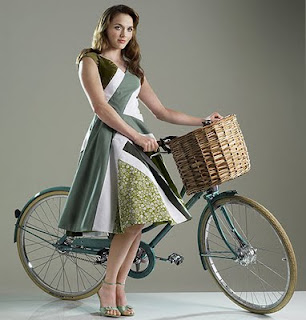From the Independent newspaper
In John Major's sepia-tinted English dream of "long shadows on county cricket grounds, warm beer, invincible green suburbs, dog-lovers and old maids bicycling through the morning mist", the old maid is surely riding a Pashley Princess. It is the most English of bicycles. From the sturdy mud and chain guards that prevent the entanglement of one's flowing skirts, to the bottom-friendly Brooks saddle, to the forlorn eyelid of steel that sweeps up to the handlebars, to the wicker basket deep enough for several bottles of fizzy pop, the Princess is a nostalgic Valhalla.
But despite a twee, Miss Marple-ish image, Pashleys are no collectors' items. Sales of the Princess have doubled in the past financial year, and Pashley has never seen such interest in its whole range, both ancient and modern. It is all the 28 employees of Pashley's Stratford-upon-Avon factory can do to keep up with demand, even though a Princess, for instance, leaves one little change from £500. Punters are not flocking to Pashley for a bargain. So what are they after?
Adrian Williams knows. At 51, the lanky, boyish director of Pashley has embraced what Americans like to term "living the brand". There is nothing Williams cannot tell you about Pashley cycles, from its inception in 1926 under the guidance of a First World War dispatch rider, W R Pashley, to its third-generation financial difficulties, to the management buy-out Mr Williams himself spearheaded 12 years ago. He now owns 75 per cent of Pashley, sharing the burden with another investor he describes as " quiet and very supportive". To reinforce his credentials, Mr Williams is wearing a Pashley-embossed belt and polo shirt. "The classics are vending very strongly," he says. "There seems to be a kick against the mass-produced. People are increasingly looking for originality, something that you can't get anywhere else. When we go to international shows, people see things that are all very samey. And that's because bikes are increasingly made by people who go to the Far East with a shopping list. There aren't these great, indigenous designs, any more. People see our stuff and feel relieved, because it's different." Pashley is certainly different. No other company in the world makes bikes like this, in a factory like this. Mr Williams came to this most English of companies via his very own St Paul moment. In the early 1990s, a friend had told him about a new Bath-Bristol cycle route. But Mr Williams did not own a bike. He borrowed one - a Pashley - and instantly fell in love.
"There I was, cycling down a hill from Bath, on a spring day with the blossom out," he says. "For a moment, my whole world slowed. A week later I went to the Paris air show, and the car I was in was jammed on the periphery for hours. That was it."
Pashley bicycles are all made for those spring days. Unlike mountain bikes, which have strong, straight handlebars and a forward-thrusting riding position, the swept, high handlebars and anterior seat positions that Pashley bicycles share, tend to encourage a straight-backed ride. Osteopaths, Mr Williams says, prefer Pashleys.
The director takes me to the factory floor, a crowded mass of things getting done. There are, all told, 150 variants of Pashley cycle, put together using 6,000 parts, by 22 production staff. The logistics of such a complex, hand-held operation, make Mr Williams visibly anxious.
"I like to think of the factory as like different plants in a pot," he says , with a satisfyingly English choice of simile. "You're trying, very carefully, to grow all the different plants at the same time. But it takes care."
To the outsider, unburdened by the director's strain of constant gardening, the factory is a joy. The sleek curves and straight spines of what will become Pashleys are lined up in orderly queues on the shop floor. Wheels of all diameters hang gleaming on racks above us. A man with a blow-torch blasts together sections of frame on a pile of bricks. And, on one work-top, there is a black vice so huge I assume it has been borrowed for the day from the London Dungeons. The staff seem genuinely in love with what they make. There are no conveyor belts, no fixed assembly line. Employees must be able to swap and change positions depending on demand, so they all know their products inside out. Mr Williams' second-in-command, Dan Farrell is, by turns, design manager, IT programmer, jigging and tooling expert, fixtures man, production overseer, and photographer. He loves Pashley so much that, for the past six years, he has lived on a canal boat moored 10 yards from the back of the factory.
Despite the increasing popularity of the consumer bicycles such as the Princess, the backbone of the company is their work-bikes. Pashley, for instance, have long supplied the Royal Mail with postman's bikes, a major commission, in terms of sales and prestige.
"This bike is specifically made for the Royal Mail," says Mr Williams caressing a shining red work-bike. "It's a handy thing because, as they have moved towards a once-a-day delivery system, they needed to be able to carry weight on the front and the back. So you need a step-through bike that is incredibly strong. And the detail is fantastic: the mudguard can stand a great deal of abuse, the specific, all-weather braking." Pashley work-bikes are, for instance, used by American motor companies and on Kazakh oil fields, so staff can make their way around vast sites. It is, Mr Williams says, an environmentally friendly alternative to bussing staff, although, in environmental terms, a few workers cycling in an oil field seems a small drop in a large barrel.
Pashley is making serious headway in London with its work-bikes. The sandwich chain Pret-a-Manger uses Pashleys to courier its lunchtime orders around the city, and Green & Blacks uses the fridge-loaded, ice-cream vending trike to keep its organic chocolate cool. Domino's Pizza, a recent convert to Pashley, was, perhaps, a little hasty in choosing red for the colour of their work-bikes; the police came knocking at their headquarters, convinced they had stolen the bicycles from the Royal Mail.
Despite the financial importance of the work-bikes to Pashley's survival, the classics are the pride of the fleet. And, of those classics, the Princess is the acknowledged queen. Beloved of recent converts, including Helena Bonham Carter, and starring in 101 Dalmatians and Simon Pegg's forthcoming film Hot Fuzz, the history of the Princess is surprisingly hard to come by. No one, not even Mr Williams, has any record of when Pashley started to make its flagship bike.
There has been only the occasional "tweak" in the Princess's design since Mr Williams's directorship, of which the replacement of the metal chainguard for a durable plastic version was the most significant, a change which caused Mr Williams, who prefers to keep things traditionally all-metal, a sleepless night or two. In the end, custom made way for the customer. "The chain used to rattle against the guard," he says. "And people thought it was annoying."
Away from the bustle of the shop-floor, a selection of Pashley's finest recline on stands. The Princess and Roadster classics sit alongside trikes of all shapes and sizes, which in turn sit alongside the Tube Riders, bendy, laid-back cruisers in pastel colours. Mr Williams rides the Pashley Moulton TSR, an odd-looking bike with a jagged frame, tiny wheels, and the upright bicycle land speed record, result of a collaboration between Pashley and the designer Alex Moulton.
The director looks over the stable with pride. "We must be masochists," he says. "To make and produce everything here. It's hard. We don't pay ourselves much because we're trying to find a margin. We've got nothing on the shelves because it all moves through so fast. I suppose the reason why I do it is that, in my blood, I am a manufacturing and engineering person. Our whole history, the reason we are a powerful nation, is because of the Industrial Revolution. So I find it extraordinary, how British people treat manufacturing and industry as something grubby. As a nation, we are a highly creative people. But we need the means to express ourselves."
Mr Williams and his team at Pashley have found their way. And cyclists are continuing to find their way to Pashley in ever greater numbers.
THE PASHLEY CLASSICS
THE PRINCESS SOVEREIGN Around £570
Perfect for Miss Marple Wannabes
Ride on the mean streets of Shepton Mallet
Special features Five-speed gearbox, a skirtguard and chaincase (so that your flowing summer dress does not come to a sticky end).
What's in your basket? A bottle of ginger beer and a jar of home-made jam
THE DELI BIKE Around £780
Perfect for Cheeky scamps.
Ride on the mean streets of The farmers' market
Special features A massive nameplate on which you can advertise your wares, a small front wheel, and a steel front carrier that can hold 25kg
What's in your basket? Bacon, loaves of bread, and luvverly fresh fruit
THE TUBE RIDER Around £470
Perfect for Surfer dudes
Ride on the mean streets of Santa Barbara
Special features Easy-ridin' cruise position ensured by the sweeping handlebars and lowseat, twist-grip gears, and a range of washed-out colours
What's in your basket? Nothing but air













